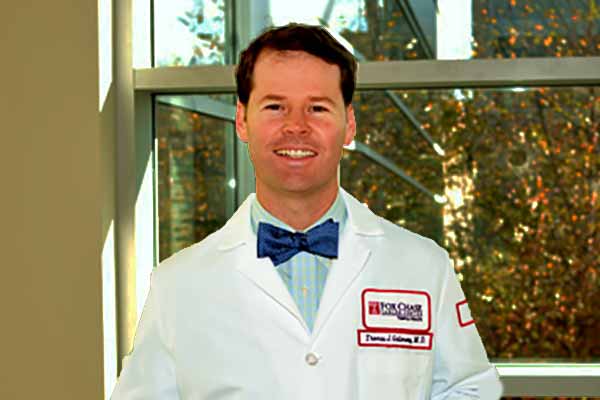
PHILADELPHIA (September 23, 2019) – Survivors of head and neck cancer may experience radiation-induced cranial neuropathy as many as 10 years after undergoing treatment for their disease, according to new research out of Fox Chase Cancer Center.
Cranial neuropathy occurs as a result of injury to the cranial nerves during radiation treatment for head and neck cancer. Damage to these cranial nerves most commonly affect a patient’s ability to speak and/or swallow.
“We had always thought that radiation did not damage cranial nerves because they get treated in every patient with head and neck cancer and we do not see cranial neuropathy that commonly,” said Thomas J. Galloway, MD, of the department of radiation oncology. “What our data is suggesting is that a small percentage of people do get cranial nerve damage from treatment, but it occurs after a long latency period.”
Galloway and colleagues retrospectively looked at data from 1100 patients who underwent radiation for head and neck cancer between 1990 and 2005 at Fox Chase. Of that large group, 112 patients had undergone systematic follow-up at Fox Chase for at least 10 years.
The most common symptom of cranial neuropathy is a change in the voice, according to Galloway. This can occur either because the person’s tongue is not working probably and they develop a sort of tongue-tie, or there is a cranial nerve injury that manifests as a vocal cord issue.
Of the 112 patients examined, 14 percent developed at least one cranial neuropathy. The median time to cranial neuropathy was more than seven years, with some patients developing cranial neuropathy more than 10 years later. These injuries were considered radiation induced when imaging or biopsy did not demonstrate a structural or malignant cause.
At Fox Chase, survivors of head and neck cancer are followed by their oncologist indefinitely, Galloway said. “There is no question that cure of the index cancer is of paramount importance and reduction in treatment to potentially avoid cranial nerve injury is not indicated. However, many survivors are discharged from their clinic after 5 years or so. The main take-home message of this study is that these patients need to be followed for the rest of their lives, if possible.”
The paper, “Incidence and Outcomes of Radiation-Induced Late Cranial Neuropathy in 10-year Survivors of Head and Neck Cancer,” was published in Oral Oncology.
This research was supported by a National Institutes of Health National Cancer Institute grant P30 CA006927.